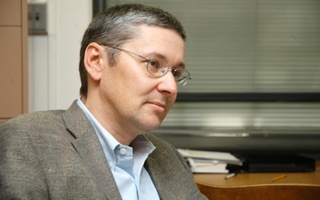During his freshman year at Harvard College, Christopher A. Sims ’63 remembers a mathematics teaching assistant warning him about a career in math.
“You would make a fine mathematician,” he recalled the teaching assistant saying. “But as a mathematician, you won’t be able to change the world.”
Sims pursued his undergraduate degree in mathematics but would later go on to study economics, winning a Nobel Prize for his work on fiscal theory and macroeconomics. The heralded academic—whose awarded work focuses on monetary policy—was an active member of the Class of 1963, manifesting his many interests across campus.
Choosing to make a career in applicable economics instead of abstract mathematics, Sims has striven to connect the theory with the data—a dedication to both the abstract and the literal that defines not only his career, but his life as both an academic, activist, father, husband, and horseback rider.
PASSION FOR ACTION
A member of the Harvard University Band, a club rugby player, a political activist, and a math prodigy, Sims was active around campus during his time at Harvard.
Sims was born in 1942 in Washington D.C.. His father—employed by the State Department—moved the family to Germany for two years when Sims was five. After Germany, the family moved to Virginia and then Connecticut. Sims was the third-string linebacker for the Greenwich High School football team and played trombone in the band.
He continued playing trombone for Harvard’s band, and switched football for club rugby and the occasional soccer game.
As an undergraduate, Sims was also involved in the student group called Tocsin, which supported policies to the left of President Kennedy and focused on nuclear proliferation.
As a member of Tocsin, Sims helped plan a march on Washington to urge President Kennedy to continue his temporary halt of nuclear testing and to give up the administration’s fallout shelter program. The march brought 60,000 students to the Washington mall.
Organizing the march “was exciting, and we felt that we had a little bit of an impact,” Sims said. “[I’m] not sure if we really did but that was kind of a high point.”
Todd A. Gitlin ’63, former president of Tocsin, remembered spending time in the car on the way to the march and remarked that Sims was easy going and cool under pressure.
As a junior, Sims organized a group of Tocsin students to travel to Connecticut to campaign for a proliferation candidate, Frank Kowalski, as a part of a larger effort to advocate for the ban of nuclear weapons. Sims said at the time that he hoped the activism would add to the larger conversation of constructive criticism that Tocsin hoped to inform.
“In Tocsin he was thoughtful, easy-going, committed, passionate about turning around the arms race, and enormously liked and respected by everyone. I mean everyone,” said fellow Tocsin member Peter C. Goldmark ’62.
BEYOND THE ABSTRACT
Read more in News
Dennis Ritchie '63, The Man Behind Your TechnologyRecommended Articles
-
Economics Department Hires New Junior FacultyMIT Ph.D. student Alp Simsek, whom economics professor Jeremy C. Stein called “the most sought-after person on the economics job market this year,” will join the economics department as an assistant professor next fall.
-
Students and Faculty Fight Nuclear TestsIn the spring of 1960, 1,359 members of the Harvard faculty signed a petition encouraging the Eisenhower administration to consider ...
-
 Mankiw Comes Out with New Textbook
Mankiw Comes Out with New Textbook -
Rogoff Receives Prize for ResearchEconomics Professor Kenneth S. Rogoff received the Deutsche Bank Prize in Financial Economics last Thursday for his contributions to the field of international finance and macroeconomics.
-
TV on the Radio’s Unpolished PowerRock band hypnotizes with stunning live sound
-
Tocsin Brings Harvard to Forefront of Student MovementFounded a decade before activism on campus peaked with the 1969 takeover of University Hall, Tocsin signaled of the start of Harvard’s student movement.














